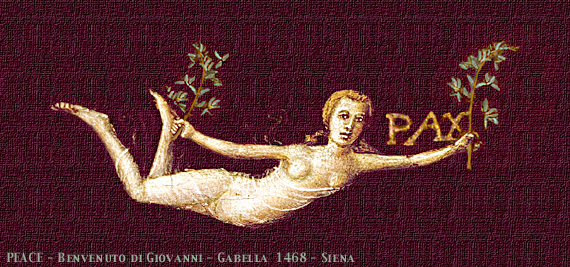Tuesday 30 July 1996
9:30 – 11:00 Session 1 Chair: Carlo Schaerf
A nuclear-Weapon-Free World: is it Desirable? Is it Possible? Is it Probable?
Francesco Calogero
11:15 – 12:45 Session 2 Chair: Bruce Larkin
Development and Peace Building
Hartwig Spitzer
16:15 – 17:45 Session 3 Chair: Victor Gilinsky
The Cold War Military in Northern Europe and its Political Implications
Arto Nokkala
18:15 – 19:45 Session 4 Chair: Mirco Elena
The Impact of the Military-Industrial Complex on Society
Gert Harigel
Wednesday 31 July 1996
9:30 – 11:00 Session 5 Chair: Joseph Di Chiaro III
Role of Technology Post-Cold War
Dietrich Schroeer
11:15 – 12:45 Session 6 Chair: Hua Han
Fissile Material Security in the Post-Cold War Era
Frank von Hippel
16:15 – 17:45 Session 7 Chair: Ioury Fedorov
Technology Policies after the Cold War: the Conversion of Military R&D in Some Western Countries
Marco Donati & Giulio Perani
18:15 – 19:45 Session 8 Chair: Paolo Cotta Ramusino
Nuclear Disarmament – Progress and Problems: View from Russia
Anatoli Diakov
Thursday 1 August 1996
9:30 – 11:00 Session 9 Chair: Olga Sukovic
Latest Development of the International Intervention in the Former Yugoslavia
Mario Zucconi
11:15 – 12:45 Session 10 Chair: Lamberto Zannier
Defusing a Cold War Relic: North Korea’s Nuclear Weapons Program
Victor Gilinsky
14:30 Trip to Siena
Friday 2 August 1996
9:30 – 11:00 Session 11 Chair: Anatoli Diakov
The Post Cold War Process of Nyclear and Conventional Weapons Reduction: the Role of NATO
Lamberto Zannier
11:15 – 12:45 Session 12 Chair: David Carlton
Will Iraq Reconstitute its Nuclear Weapons Program: Taking Stock after General Kamel’s Defection (and re-Defection). What is the Status of Iran’s Nuclear Weapons Program? Iran/Russian Nuclear Cooperation
David Albright
16:15 – 17:45 Session 13 Chair: Saiful Islam
Management and Reduction of Surplus Conventional Weapons
Joseph di Chiaro
18:15 – 19:45 Session 14 Chair: Angelika Brikman
Military Technology in China: Implications for Security and Export Controls
Eric Arnett
Saturday 3 August 1996
9:30 – 11:00 Session 15 Chair: Yiorghos Leventis
Future Peace Operations: Learning from Recent Experience
Alex Gliksman
11:15 – 12:45 Session 16 Chair: Billie Bielckus
Nuclear Rollback in South Africa
David Albright
18:15 – 19:45 Session 17 Chair: Giulio Perani
The New World Order and the Tempo of Militant Islam
Hilal Khashan
Sunday 4 August 1996
9:30 – 11:00 Session 18 Chair: Gert Harigel
Russia’s Nuclear Policy after the USSR
Ioury Fedorov
11:15 – 12:45 Session 19 Chair: Isabella Spanò
The Legacy of Cold War Posturing Concerning the Search for Nuclear Disarmament
David Carlton
18:15 – 19:45 Session 20 Chair: Bruce Dayton
A Cultural Analysis of Armament/Disarmament
Eliana Martella
Monday 5 August 1996
9:30 – 11:00 Session 21 Chair: Ciro Zoppo
The Open-Skies Treaty as a Tool for Confidence Building and Arms Control
Hartwig Spitzer
11:15 – 12:45 Session 22 Chair: Dietrich Schroeer
Verification: What is the New Verification Game and which Technologies do we Have at our Disposal
Patricia Lewis
14:30 Trip to San Gimignano
Tuesday 6 August 1996
9:30 – 11:00 Session 23 Chair: Arto Nokkala
Unintentional Nuclear Fire
Ciro Zoppo
11:15 – 12:45 Session 24 Chair: Marco Donati
The Feasibility of Much Deeper post-START II Nuclear Reductions
Frank von Hippel
18:00 – 19:45 Session 25 Panel
Coordination among the Nuclear Weapon States
Bruce Larkin
Wednesday 7 August 1996
9:30 – 11:00 Session 26 Chair: Hartwig Spitzer
Implications of the Comprehensive Nuclear Test Ban for Nuclear Modernization and Proliferation
Eric Arnett
11:15 – 12:45 Session 27 Chair: Alessandro Pascolini
Conflicts with the Use of Armed Forces on the Territory of CIS: Tadjikistan, Moldova, Georgia, Chechnya… What’s Next?
Alexander Nikitin

